|
|
|
Sort Order |
|
|
|
Items / Page
|
|
|
|
|
|
|
| Srl | Item |
| 1 |
ID:
131477
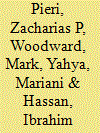

|
|
|
|
|
| Publication |
2014.
|
| Summary/Abstract |
This paper examines the concept of (public) sin as well as efforts to counteract sin from the perspective of Islam. The understanding that hisba, the prohibition of vice and enjoining of virtues, are a responsibility of both the state and the community is common in historical and contemporary Muslim societies. Where the state cannot or does not provide means for countering (public) sin, the perception for some Muslims is that the responsibility on the community and individuals to do so increases. Based on ethnographic research in Britain, Nigeria, Indonesia, Malaysia, and Singapore, the paper highlights examples of how sin has been defined amongst Muslim communities as well as the methods and rationales given to justify the forbidding of sin as a collective and communal public obligation. As the world becomes more integrated, there is growing concern amongst Muslim communities that sin is becoming the norm, leading society to degeneracy, that people who would not have otherwise sinned are influenced to do so. Common features in forbidding sin across Muslim communities have appeared, often focusing on what are seen as moral issues such as dress codes, music, gambling, alcohol, smoking, and the mixing of men and women in public. The forbidding of sin has resulted in attempts to introduce "Shari'a Zones" in some predominantly Muslim areas of London, whilst in Indonesia, this has given rise to the Islamic Defenders Front and in some Northern Nigerian states to the reintroduction of the criminal codes of the Shari'a.
|
|
|
|
|
|
|
|
|
|
|
|
|
|
|
|
| 2 |
ID:
196644


|
|
|
|
|
| Summary/Abstract |
The papers included in this special issue and others published previously in this journal provide examples of some of the ways in which Muslim communities responded to the Covid-19 pandemic. In addition to introducing the individual papers, I will make one basic point in this introduction. This is that there were no distinctively Muslim responses. Muslims responded to it in much the same ways that adherents of other religions did. The variety of Muslim responses most closely resembled those of Christians and Jews because of their shared religious heritage.Footnote1 All were concerned with questions of theodicy that are inherent in monotheistic religions. Simply put, these concern the question of how to reconcile the existence of evil and misfortune (including pandemics) with the concept of an omnipotent and benevolent God.
|
|
|
|
|
|
|
|
|
|
|
|
|
|
|
|
| 3 |
ID:
120595
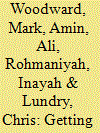

|
|
|
|
|
| Publication |
2013.
|
| Summary/Abstract |
Partai Keadilan Sejahtera (PKS, The Justice and Prosperity Party) is the largest Islamist political party in Indonesia. It has roots in the religious and political and religious teachings of the Muslim Brotherhood and promotes what Oliver Roy calls "deculturized religion." The party can be understood as the political component of a larger social movement that seeks to transform Indonesian society and culture in ways that would establish Shari'ah as social, if not political, reality. It is also committed to the electoral process and to working inside the Indonesian political system in a more general sense. Until recently, the PKS has dismissed local modes of Muslim practice and much of Indonesian culture as "un-Islamic." The extent of the party's transformative agenda is unclear for three reasons: it shares the Muslim Brotherhood's gradualist approach, it is less than transparent about its goals, and it is divided into purist or "Justice" and pragmatic or "Prosperity" factions. The leadership of the Prosperity faction is currently ascendant and is attempting to reach beyond its Islamist base by sponsoring musical and dramatic performances it hopes will appeal to Muslims devoted to Javanese and other Indonesian cultural traditions. Ethnographic and web-based research indicate that these efforts are greeted with considerable suspicion.
|
|
|
|
|
|
|
|
|
|
|
|
|
|
|
|
| 4 |
ID:
081030
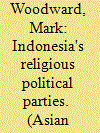

|
|
|
|
|
| Publication |
2008.
|
| Summary/Abstract |
The Indonesian democratic transition of the late 1990s led to the formation of numerous political parties many of which are religious. Only the Islamic parties are politically significant. It is possible to distinguish two basic types of religious parties. Some are based on explicitly religious principles; others are nominally secular but are led by religious figures or appeal to particular religious communities. While Indonesia is predominantly Muslim, Islamic parties have had only limited appeal. The openness of the political system and the ability of minor parties to enter coalitions has provided their leaders access to office and patronage. Even the Islamist Justice and Prosperity Party that resembles the Egyptian Muslim Brotherhood has chosen political participation instead of confrontation
|
|
|
|
|
|
|
|
|
|
|
|
|
|
|
|
| 5 |
ID:
131482
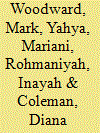

|
|
|
|
|
| Publication |
2014.
|
| Summary/Abstract |
In this paper we explore the ways in which the Indonesian Front Pembela Islam (Islamic Defenders Front-FPI) uses hate speech and demonization to legitimize violent attacks on organizations and individuals it considers to be sinful or religiously deviant, and civil discourse to establish credibility and respectability.
We argue that the use of a discursive frame established by fatwa (legal opinions) issued by the semi-official Majelis Ulama Indonesia (MUI-Indonesian Council of Muslim Scholars) and tacit support from powerful political factions enable FPI to conduct campaigns of demonization and violence with near impunity and to avoid being labeled as a terrorist organization. We elaborate on a distinction between what the Center for Religious and Cross-Cultural Studies (CRCS) at Gadjah Mada University calls the two faces of FPI (Bagir et al. 2010a). The CRCS report distinguishes between civil and uncivil modes of FPI discourse and praxis. The civil mode seeks to establish the organization's credibility in the public sphere. It presents FPI as the ally of authorities in attempts to control deviance and assisting those in need, especially victims of natural disasters.
|
|
|
|
|
|
|
|
|
|
|
|
|
|
|
|
| 6 |
ID:
171859
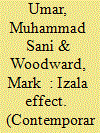

|
|
|
|
|
| Summary/Abstract |
Salafism is a revivalist current in Sunni Islam rooted in the teachings of the fourteenth century Hanbalite jurist Taqi ad-Din Ahmad ibn Taymiyyah and the eighteenth century Arabian reformer Muhammad ibn ʿAbd al-Wahhab. Salafis condemn Sufism (Islamic Mysticism) and most forms of popular Muslim piety, including music, as shirk (polytheism) and unbelief. The Wahhabi variant of Salafism is the only form of Islam permissible in Saudi Arabia and the ideology underlying ISIS and other violent extremist movements. This essay shows that despite the expenditure of vast sums by the Saudi and Kuwaiti governments and NGOs efforts to promote Salafi teachings and armed struggles by ISIS and others to impose them, Salafism has a very limited popular appeal. It is based on textual, ethnographic and survey data from two of the most populous Muslim countries, Indonesia and Nigeria. It also shows that efforts to promote Salafism have led to a resurgence of traditional Sufi oriented piety, especially devotional music traditions.
|
|
|
|
|
|
|
|
|
|
|
|
|
|
|
|
| 7 |
ID:
196647


|
|
|
|
|
| Summary/Abstract |
The Prophet Muhammad and the English novelist Defoe both wrote of the ravages of the Bubonic Plague that killed hundreds of millions of people in Africa, Asia and Europe from the sixth through seventeenth centuries in a series of recurrent pandemics. Remarkably they both intuitively understood some of the basic principles of epidemiology centuries before it developed as an exact science.
|
|
|
|
|
|
|
|
|
|
|
|
|
|
|
|
| 8 |
ID:
154691


|
|
|
|
|
| Summary/Abstract |
Adopting Arabic clothing styles and in other ways mimicking Saudi Arabian cultural practice is one of the defining characteristics of the Indonesian tarbiyah (Islamic education) movement and the more general influence of Saudi Arabian Wahhabism and other forms of Middle Eastern style Salafism that has emerged in Indonesia since the early 1980s. This paper includes a translation of and extended commentary on a short story by Professor Komaruddin Hidayat of Syarif Hidayatullah State Islamic University in Jakarta that is highly critical of this trend. This is a counter narrative that references two Indonesian national heroes: Kyai Hasyim Asy’ari (1875–1947) one of the founders of Nhadlatul Ulama, the country’s largest Muslim organization and Mohammad Hatta (1902–1980), the first Vice-president. Professor Hidayat uses a short story to make the point that Islamic authenticity need not be based on the emulation of Saudi Arabian cultural practices and that Islam, Indonesian cultures, and nationalism are entirely compatible.
|
|
|
|
|
|
|
|
|
|
|
|
|
|
|
|
| 9 |
ID:
098226
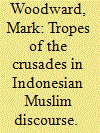

|
|
|
|
|
|
|
|